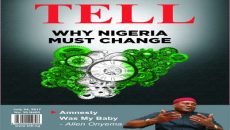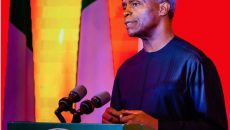Those clamouring for restructuring of Nigeria insist it will produce a country where healthy rivalry among regions will promote development, douse the current recrimination between the nationalities and engender peaceful co-existence.[powr-banner-slider id=f615b390_1500277847679]
It will not be the same country that President Muhammadu Buhari left over 70 days ago for medical management in London that he will be returning to. He may be shocked at how much, and how fast, things have changed and are changing in the polity with the increasing clamour for the restructuring of the country inspired by his style of leadership, largely seen as divisive. He would also be surprised that some members of the political elite, who hitherto had viewed agitation for restructuring as somewhat of felony, are among the new converts.
Last Wednesday, the National Assembly weighed in on the most trending discourse in Nigeria today, saying it would not stand in the way of restricting if it is what Nigerians want. Yakubu Dogara, speaker of the House of Representatives, said that restructuring can only be done through constitutional amendment and that NASS will not constitute a stumbling block to aspirations for genuine changes. “I wish to say that the House of Representatives, and indeed the National Assembly, is ready to do its part in terms of amending the Constitution when consensus have been reached on any matter by stakeholders and Nigerian citizens.”
Dogara, like many other statesmen, among them Ibrahim Babangida, former military head of state clerics, opinion leaders, traditional rulers and politicians, bowed to the flood of informed opinion that to save Nigeria, the country should restructure to fulfill the desires and aspirations of the various blocs that make up the country.
Sebastine Hon, senior advocate of Nigeria, SAN assessed the tide last week and noted that “for the first time, voices which were hitherto opposed to such agitation have oozed out of their closets in support of the latest clamour for restructuring.” To him, this is a sign that “meaningful engagement on the subject might yield results.” Like Dogara, he said that any significant restructuring will entail “a deep amendment of our constitution.”
Buhari’s absence for over two months has heightened the power play in the presidency with a cabal said to be undermining the power of the Acting President, Yemi Osinbajo, who hopped over to London last Tuesday for a one hour consultation with the President on what is seen as critical decisions that needed to be taken in the face of increasing tension and disharmony in the country. Buhari’s controversial 95/05 percent governance policy dichotomy in favour of those who ‘voted’ for him has caused serious exclusions, which gave rise to the latest agitation for secession and restructuring. This perceived absence of justice and equity in the management of the country and inequitable distribution of common resources has inflamed some youths to begin the agitation to renegotiate the Nigeria union.
The Southeast, Southsouth, Southwest and Northcentral believe that they will fare better in a restructured Nigeria, like in first Republic. For instance, Ike Ekweremadu, deputy president of the Senate recalled that “the Eastern Region was rated the fastest growing economy in Africa in the First Republic because the regions were relatively autonomous; resources were largely developed and controlled by the regions.” Proponents of restructuring often say that they are sad that the glory of the first republic was being eroded by the lack of vision and greed of today’s political leaders. The political and economic structure of the first republic encouraged the giant leaps recorded by the leaders of those regions, some of whose feats are now reference points. So those who are campaigning for restructuring largely want a return to that era where the potentials of each region will be harnessed for the people of the area, as it was in the past. Leaders of the southeast zone, therefore, like their counterparts in the southwest, appear hungry for that healthy regional competition, which Wole Soyinka, Nobel laureate says is lacking now.
On its part the Southsouth feels that a restructured Nigeria will guarantee them a control of their resources, participation in the oil economy and grassroots development. The consequence of that is the elimination of militancy in the Niger Delta region, which will then give room to an improved production of oil resources there, thus empowering the region to pay the required royalty to the government at the centre. It is also hoped that states in the region will beef up activities on other economic commodities in their area. Perhaps that will resuscitate the rubber and palm plantations. Many people who are in the vanguard of restructuring are also confident that once local political leaders are directly responsible for revenue generation, it will be easy for the people to hold them accountable. This is because they believe that such leaders will no longer be able to make excuses for lack of development.
In the Southwest, where agitation for restructuring has been sweet chorus for years, leaders are conscious that they will be watched by followers who have been thirsty for development, since the long break from what heroic leaders of old did for them. The region, which is regarded as the economic hub and commercial capital of Nigeria, is also the hot bed of political activism. Lagos State, which is in the region, is the largest economy in the country. It is followed by Ondo State, which has the largest Bitumen deposit in Nigeria. Ondo and neighbouring Ekiti are very rich in solid minerals and gold now being illegally mined is expected to give economic boost to Osun State; while the whole region is very rich in agriculture. The crude oil price crisis of recent has prompted some states in the region to return to the farm, seeking to bring back the cocoa revolution of old and complementing it with crops cashew among others. Restructuring, it is argued, will enable the Yoruba of the Southwest to harness these potentials and prosper. The three zones in the South feel held-down by the North and believe restructuring will free them from an unproductive bondage.
The Northcentral geo-political zone also feels unequally yoked to Northwest and have signed up for restructuring to free them from Hausa/Fulani domination that dates back to Uthaman dan Fodio’s Jihad of 1804. They lament of loss of identity, oppression and their farmlands being turned into grazing fields for cows in the name of ‘One North.’ The area came under severe attacks from Fulani herdsmen in recent past, with records of fatalities, a development that also got reluctant response from the leadership at the centre. So, they assumed that the authorities subsumed their existence to political control by the Fulani who they believe have the sympathy of the people in power.
Follow Us on Social Media



 WhatsApp us
WhatsApp us